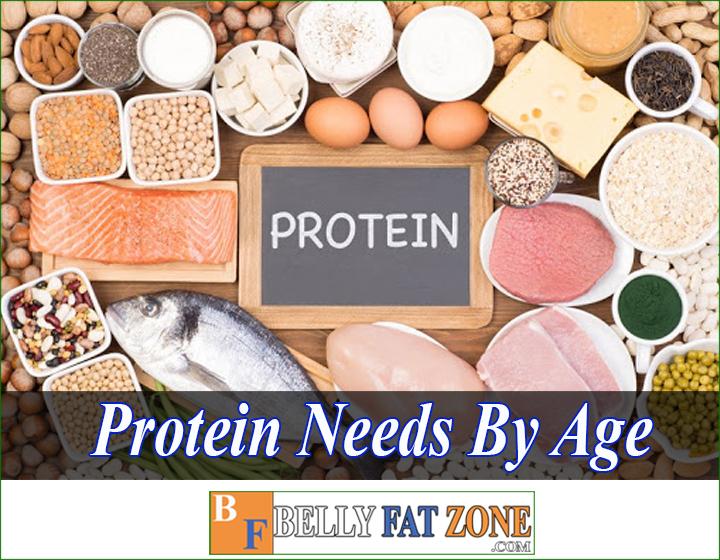After reading this article, you will understand most of the issues related to weight management; you will avoid ridiculous products and fancy advertising to make your money less.
When your money goes down, but it doesn't work, or the effect only happens within a short initial time, one to two weeks later, everything is back to the same even if you cannot control your body and lead to unfortunate illnesses.
The principles for controlling our weight are based on well-proven and scientifically proven factors, but what happens to our bodies doesn't happen within 1-2 weeks.
That is what people are influenced by the products or people promoting the fast, speedy shirts.

This is a scientific and detailed article on weight management, muscle gain, and fat loss.
It may not be simple, not easy to read, and not concise, but I believe it will give you all the knowledge you need to fully understand the problem and not be confused by disturbing information.
If you know the “principles” knowledge in this article, then the big picture about weight control, fat gain will become clearer.
And I believe this will be a solid foundation for you to control your own weight and have the necessary “immunity” to the ridiculous information, products …
I. The most important factors in exercise nutrition
Order of priority from bottom to top: (from top to bottom)
- Control how much energy you put in and how much energy you spend
- Control macronutrients: carbs, fat, protein
- Micronutrients: vitamins, minerals
- Pay attention to when to load nutrition
- Food supplement
In exercise nutrition too. There are many different dieting methods to achieve the goal, but in general, we still have to follow the law of energy conservation. Basically:
- Calories intake> Calories consumed: weight gain
- Calories loaded = Calories consumed: keep weight
- Calories loaded <Calories consumption: weight loss
It is a necessary condition, and a sufficient condition is that the process optimization factors will be given priority in the following order.
A. Energy balance
The first factor is also the prerequisite. If you do not guarantee this factor, the remaining factors have no meaning for your weight gain goal.
Energy balance here is based on the principle of conserving energy, our body as a medium for energy metabolism.
We eat food; the body will metabolize and create energy for the body to function when active again consumes energy to recharge by eating, drinking.
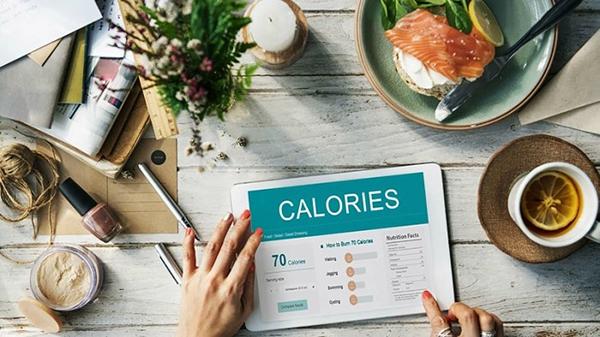
Finally, to lose weight first, you must ensure an energy deficit (Calories in <Calories out). Weight gain, muscle gain, then excess energy (Calories in> Calories out).
After determining the energy level and motor intensity for your personal goals, you continue to note the following factors.
B. Macronomic elements – MACRO NUTRIENT
Includes Protein (Protein), Starch (Carb), and Fat (Fat). These macronutrients through digestion and absorption will create the main energy source for life and physical activities.
Although they both provide energy, each will have advantages in different bodily activities. So the proper proportions matching your goals and fitness are the next step you need to take note of.
C. Micronutrients – MICRONUTRIENTS
Includes Vitamins and Minerals. If we consider the macronutrients like gasoline to power the engine, the trace elements will be like engine oil to smoothly operate the internal movements.
Although they do not directly affect weight gain and loss, these trace elements will regulate hormones and support the immune system.
Whether you are gaining weight or losing weight, you should ensure that your body is balanced and healthy by getting enough trace elements.
D. Time of nutritional intake – NUTRIENTS TIMING
The time of moderate nutrient intake will determine the mechanism of secreting acid in the stomach that helps digest food. The Hormone concentration also changes continuously at times of the day.
Moderately optimizing your energy intake time also helps you get the most out of Hormone's contribution to your needs.
E. SUPPLEMENTS – SUPPLEMENTS
Its name says the priority level in the nutrient pyramid; we need to add that.
And the most common myth is to think that drinking Whey Protein will automatically increase muscle; it must be said that Whey only helps us to add protein no more, no less.
Also, gaining muscle or not is due to exercise with enough stimulation, adequate rest, recovery, nutrition before/during/after many people on the body also test a workout … Or fat-burning foods.
However, in fact, they only burn about 70 more calories/day (~ 1 candy). Fat burning foods may sound very powerful, but it turns out that you just need to take a few tablespoons of rice or take a sip of milk tea to have the same results.
II. Laws of energy conservation, weight gain, weight loss
1 / Energy
We all know the conservative energy theory; basically, unnatural energy is produced and not naturally lost, and we humans are not outside of this law.
We cannot generate energy for living and physical activities ourselves; we are rather an intermediary: taking energy from food by eating, digesting, absorbing, and converting to for their own activities.
Therefore, gaining weight or losing weight, losing fat, is ultimately a balance between the two ends: input and energy output through our bodies.
The Law of Conservation of Energy is an unchanging principle, the way the human body and all creatures function in nature.
So, if anyone introduces you to a method or tool that “breaks” this rule and gives you the “miraculous” fat loss effect, then one is that they don't master the knowledge. ;
Second, they are trying to sell you a product. Typical examples include belly brace belt, belly fat thinner, weight loss tea, weight loss foods, weight loss pills, detox products, etc.
All these things have no basis and are ridiculous. Remember that when it comes to weight management, energy balance is a prerequisite and almost no exceptions.
When it comes to energy in nutrition, we have many metrics, but the two most common ones you see everywhere are Calories (kcal) and Kilo-Joules (kJ). Of which, Calories (kcal) are used more.
ENERGY INPUT (CALORIES INTAKE)
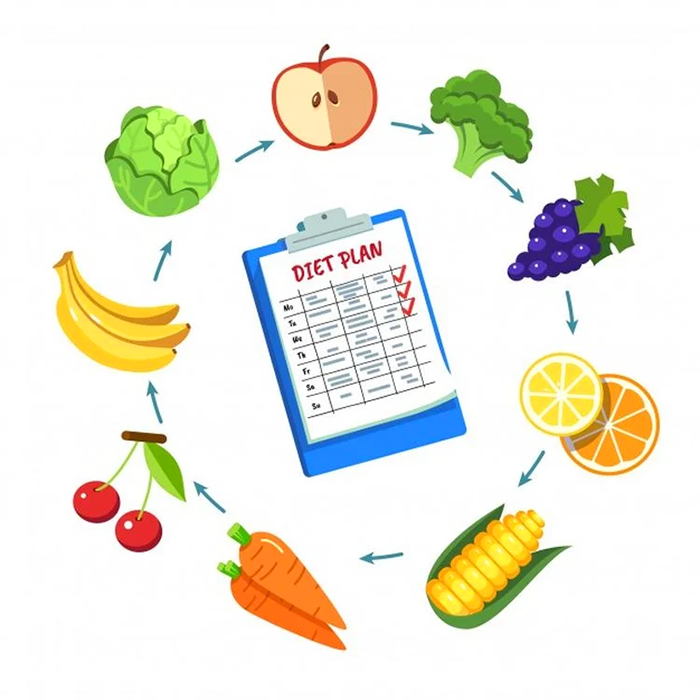
Basically, the source of calories loaded for the body is always food, and food always includes 3 main macronutrients/nutrients:
- Protein (protein)
- Starches (carbs)
- Fat
Inside
- 1 gr Protein = 5.65 kcal
- 1 gr Starch = 4.18 kcal
- 1 gr Fat = 9.44 kcal
- (Besides 1 gr of alcohol for 7.09 kcal)
It sounds quite wrong compared to the information you read often: 1g starch = 1g protein = 4 kcal; 1g fat = 9 kcal. However, the difference here is that these macronutrients, after being digested and absorbed into the body, lose energy).
Tip: For calories in food, you need to be careful. 100 grams of rice doesn't mean 100g of carbs. Similarly, 100 grams of beef does not mean 100 grams of protein.
Because in addition to the main nutritional ingredient, most foods contain quite a bit of water. The best way is to look up how many grams of nutrients per 100g of food …
ENERGY OUT (CALORIES OUT)
While energy input to the body comes from food, the body's output energy is consumed through 3 main ways:
The minimum amount of energy the body needs to maintain basic living activities (excluding movement and digestion). This amount of energy accounts for about 70-80% of inactive people's total energy consumption.
You can measure BMR with many different formulas. Here is a simple and widely used formula:
- Mifflin formula:
Men: BMR = (10x mass kg) + (6.25x height cm) – (age 5x) + 5
Women: BMR = (10x mass kg) + (6.25x height cm) – (age 5x) -161
For example, a man weighing 67kg, 165cm tall, and 23 years old will have metabolic energy per day = ~ 1590 kcal.
2 / Thermic Effect of Food
The processes of digesting and absorbing food both require heat, depending on each nutrient's characteristics (macro) that we eat.
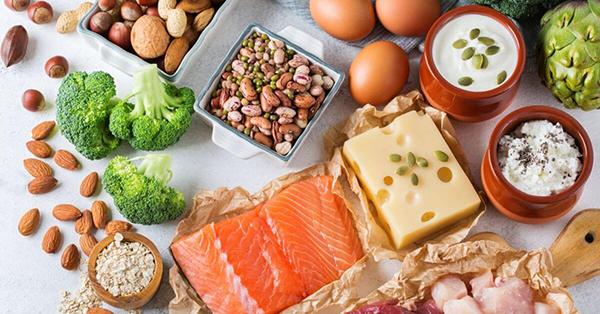
Protein has the greatest thermal effect, while Fat has the lowest heat effect. Basically, the amount of energy used to digest food accounts for about 10% of the body's total energy consumption per day.
Tip: This is one reason you should eat plenty of protein during weight loss / fat loss.
Besides keeping you fuller for longer and minimizing muscle loss (discussed more in section 2), the protein itself also requires your body to burn more energy than fats and carbohydrates to digest. I will assist you in reaching your most important goal, the cal deficit.
3 / Physical Activity
Physical activities and sports use energy depending on that activity's characteristics but fluctuate at 10-20% of total energy consumption per day. For example, 30 minutes of soccer can burn about 180 kcal, tennis about 150kcal, …

In particular, intense physical activities require energy consumption during exercise and burn energy after exercise (post-exercise oxygen compensation-EPOC), helping us burn.
More energy than low-intensity activities and helps increase basal metabolic energy BMR.
Tip: You see. The energy burned from exercise also plays only a tiny part of the total energy you consume each day.
Even if you jog for 1 hour, you can get about 500 calories, maybe not as much as a glass of milk tea! What does this mean?
Exercising more is not necessarily the best answer to weight management; it is just a support tool. Nutrition is still important. – charged energy source.
Combining the 3 energy outputs, we will have:
Total Daily Energy Consumption (TDEE) = BMR + TE + PA
You can calculate your TDEE relatively as follows or use the TDEE calculator here:
| Life style | Describe | TDEE |
| Passive | Sitting a lot during the day, not moving around. Exercise little or no exercise. | TDEE = BMR x 1.2 |
| Do light exercise | Sitting a lot during the day, not moving around. Light exercise 1-3 days/week | TDEE = BMR x 1.375 |
| Exercise moderately | Have active walking during the day, exercise 3-5 days/week | TDEE = BMR x 1.55 |
| Dynamic | Active lifestyle, running around a lot. Exercise 6-7 days/week | TDEE = BMR x 1.725 |
| Professional athletes | Extremely dynamic. Do intense exercise 6-7 days a week (sometimes 2 times a day). | TDEE = BMR x 1.9 |
Use the example from Metabolic Energy (BMR) again: a man weighing 67 kg, 165 cm tall, and 23 years old will have metabolic energy per day = 1590 kcal. If he has an active lifestyle, the Total Daily Energy Consumption (TDEE) would be ~ 2700 calories (1590 × 1,725).
Energy balance
The key to weight management, weight gain, weight loss, and somehow gain muscle, lose fat lies here. This is a typical application of the Law of Conservation of Energy.

Energy is neither generated nor lost by itself; it just changes from one form to another.
If the total energy intake (eating) is greater than the total energy consumed (TDEE), the body will convert the excess energy into storage units in the body, and you will gain weight and vice versa.
See the table below:
| Status | Effect | Result |
| Excess energy (calories surplus) |
The body stores excess energy by building muscle or fat, or both | Weight gain |
| Energy balance | Nothing changes | Keep weight |
| Energy shortage (cal deficit) |
The body will burn its stored energy (be it muscle or fat, or both) to sustain life. | Weight loss |
An energy imbalance affects not only weight but also physiological functions and hormone balance of the body. We will discuss these in more depth in other articles !!
The important thing to keep in mind here is:
Weight Gain doesn't mean Muscle Gain.

Maintaining a higher kcal intake than kcal consumed can cause you to gain muscle and fat (or 1 in 2 more).
And to gain weight, primarily muscle gain, you need to create muscle stimulation so that this excess is more likely to be converted to muscle than fat (muscle protein synthesis).
This stimulation is generated by resistance/strength training, or in some cases, by supplements or steroids.
Losing weight does not mean Losing Fat.
Eating less than your body needs can lead to weight loss.
However, 70% of the energy needed by the body is to sustain life (BMR), so if the deficit is too large, the body will switch to a mode of survival and protect the body's basic functions.
The body breaks down muscle and lean mass to create amino acids and uses them as energy to feed the body can occur.
So unscientific weight loss, too large deficits cause disturbances to the home environment can be counterproductive (increasing the percentage of body fat due to fat is a form of energy maintenance) while losing muscle.
To limit this, maintain a reasonable kcal deficit, and maintain exercise, limiting strength loss can increase the need for lean mass storage, thereby maintaining muscle mass and losing fat—more fruit.
Decode some common myths
Eating carbs (starches) will make you gain weight/gain fat?
Wrong. Starch does not make you gain weight. Only the excess of energy makes you gain weight. And starches, sometimes the fastest way to excess energy.
For example, it would be difficult to eat a meat or vegetable meal, right? But imagine how easy it is for you to drink a glass of water with whole sugar (1 form of starch), or eat a meal of rice …
Because it is so easy to consume, people tend to overdo it, leading to excess energy and weight gain. Then passed each other's ears are Starch = Weight gain, over time it becomes a myth.
In fact, when you keep an energy deficit, even if you eat nothing all day and eat only carbohydrates, you will still lose weight (however, weight loss here is a lot. the risk will also decrease lean mass due to lack of protein).
On the contrary, if you have an excess of energy (calories surplus), you will still gain weight even if you eat protein all day. So again, the article wants to emphasize: Energy Balance is the most important thing, is the key in weight management, including weight gain and weight loss.
When you have the right energy balance and start thinking about gaining muscle or losing FAT, does it become important to compare nutrients' roles? Read more in Part 2 – Principles of Muscle Gain & Fat Loss.
Cardio helps you lose weight?
Cardio by itself does not naturally help you lose weight. In fact, it is just the way, and the destination is still an energy deficit.

Suppose you eat an excess of 1000 calories/day. Even if you run for an hour (about 500 calories burned), you will still gain weight.
Conversely, if you eat and drink well during the day, cardio will help you burn the extra calories needed to maintain an energy deficit, leading to weight loss (e.g., overeating 200 calories, cardio burning) 300 calories, 100 calories deficit => weight loss).
The problem with cardio is that you are more likely to burn your muscles to fuel exercise if you overuse or misuse it. What are we going to learn about Cardio?
Famous weight loss methods?
We all know many famous weight loss methods, such as Low carb, Das, Intermittent fasting, keto, … However, as analyzed above, the core factor is the kcal deficit environment.
And each diet will be suitable for physiological characteristics, pathology, living habits, exercise program, and conditions of each person.
So there is no need to emphasize special methods or follow the methods of others, but one should monitor and apply them to the body to find the most suitable method. And the most important thing is maintaining the calorie deficit.
| How popular diets work | ||
| Diet | Describe | How it works |
| Low Card | Eat fewer carbs and more protein and fat-rich foods. | By creating a caloric deficit |
| Ketogenic | Almost no carbs, some protein, and mostly fat | By creating a caloric deficit |
| Low Fat | Avoid fatty foods and eat mostly protein and carbs. | By creating a caloric deficit |
| Intermittent Fasting (Fasting interruption) |
Limit your eating time to just a few hours a day | By creating a caloric deficit |
| Weight Watchers | Score-based system to help control portion sizes | By creating a caloric deficit |
| Paleo | Eat only minimally processed “prehistoric” foods. | By creating a caloric deficit |
| “All Roads Lead to Rome – All roads lead to Rome.” | ||
You need to understand: The Method is just the way; the Energy Penetration is the destination.
So, the mistake of many people is comparing one method of losing weight with another. Do they often ask what the best method of weight loss is?
I think this is the wrong question. The right question is: Which method is most suitable for me to create an energy deficit environment?
For example, it is Intermittent Fasting – Not because it is magical, but because it conforms to my lifestyle to induce a caloric deficit.
Food “clean,” healthy, healthy will help you lose weight?
First, you have to be transparent about eating to lose weight, and eating for health are two different concepts.
Health foods are foods high in fiber and high in vitamins, minerals … and it's good for your HEALTH. This doesn't mean it's good for WEIGHT WEIGHT or your bodybuilding GOAL.
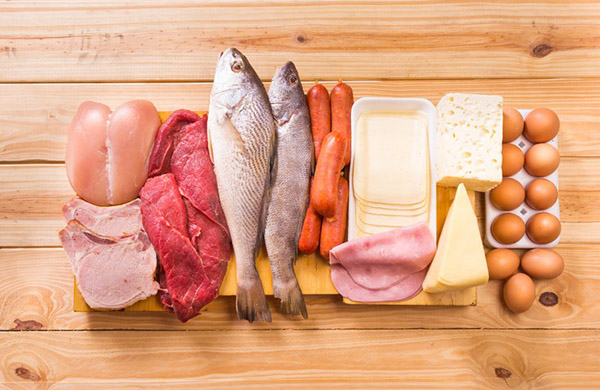
Once again, an energy deficit is necessary, so no matter how clean you eat, you eat a lot, exceeding your body's requirements, you will still gain weight.
Conversely, even if you eat bad, unhealthy things (fast foods), but the amount of kcal is still controlled in the deficit, you will still lose weight.
If you want to achieve both your weight control and good health goals, you should eat healthily, maybe eat “health food,” but just enough so that you don't have excess energy.
Eating fruit helps to lose weight?
Again, an energy deficit is a necessary condition.
Fruit contains a lot of sugar. Rice contains a lot of sugar. Soda contains a lot of sugar. Each type of sugar here is different, but every 1 gram of sugar (starch) is converted to ~ 4 calories when ingested. And if you have excess calories, then you will gain weight.
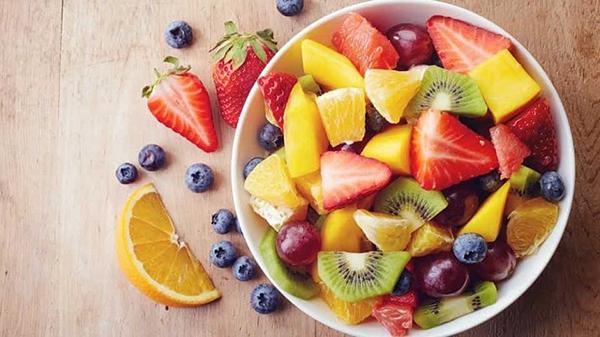
However, most fruits' sugar content is not high, as well as a slow absorption rate (low GI) due to its high fiber content, along with many vitamins, so it is good for your health. If choosing between fruit and soft drinks, then the fruit is still the better choice.
The only thing you need to note is that fruit is not a divine way to lose weight, as many people think. Even with some people who are obese and have diabetes, sometimes you should limit some fruits if you do not want the weight loss effect to be affected.
Lose Weight with Food Combining (5 Principles)
Summary
- The Law of Energy Conservation – Energy Balance is the prerequisite factor in weight control.
- To gain weight, you have to consume more energy than you consume (calories in> calories out). All methods are just tools to help you achieve this energy surplus.
- You have to consume more energy than you take in (calories in <calories out) to lose weight. All methods are just tools to assist you in achieving this energy gap.
- However, gaining weight does not mean gaining muscle. And losing weight doesn't mean losing fat.
Decoding myths:
- Carbs (starches) are not the culprits of gaining weight.
- Cardio (or whatever exercise) doesn't naturally help you lose weight. It is just the way, a supportive tool to create an energy deficit, leading to weight loss.
- All of the most famous weight loss methods have a single goal, which is an energy deficit. Therefore, do not compare, quarrel about which method is better. Just choose the method you feel is most suitable for you.
- Eating healthy will be good for your health. It has nothing to do with controlling your weight.
- Eating fruit doesn't help you lose weight.
View more:
- How To Lose Weight With Vegetables and Fruit?
- How To Gain Muscle While Losing Fat? Principles You Need To Master
- What Is Cardio Exercise? What Are The Most Effective?
Hopefully, the information above has helped you gain some more knowledge about “weight management principles” and bring some small value. Please share this article if you feel it is useful. Thanks!

